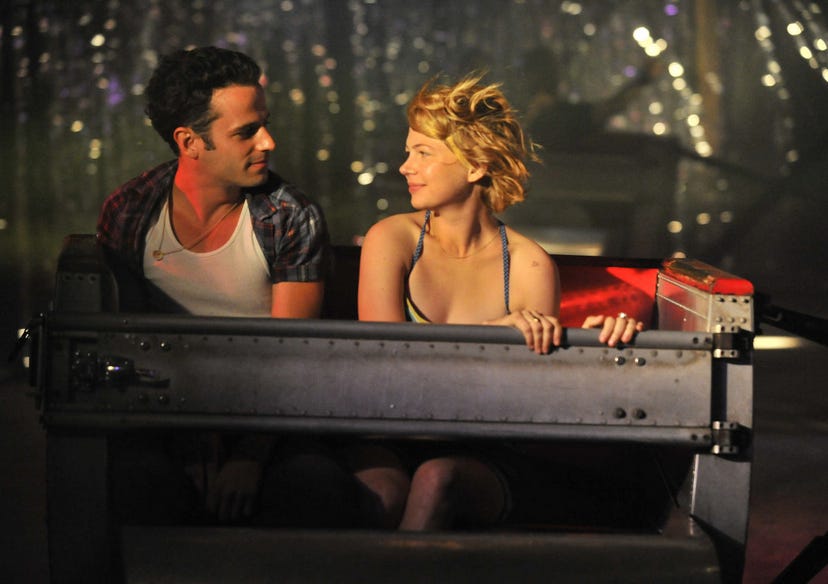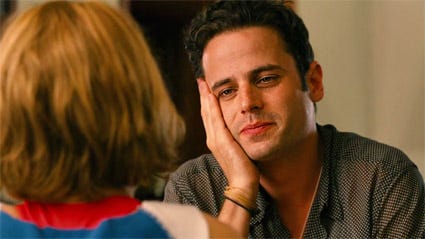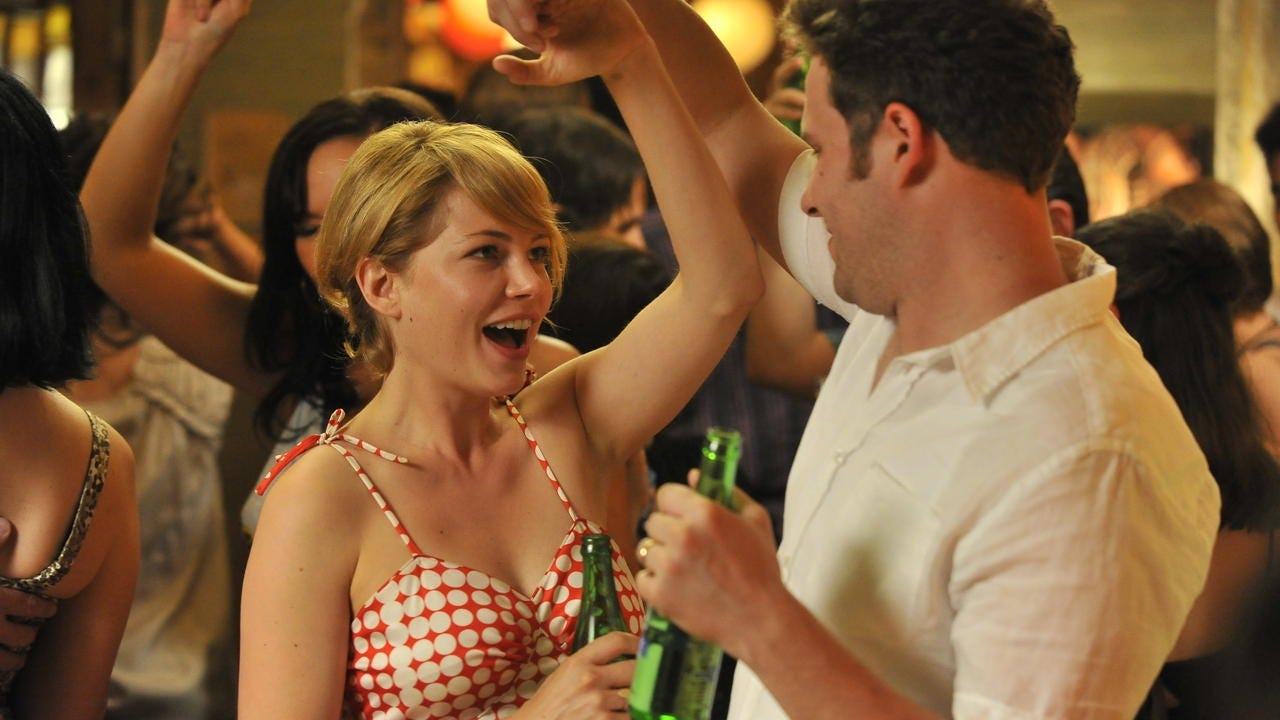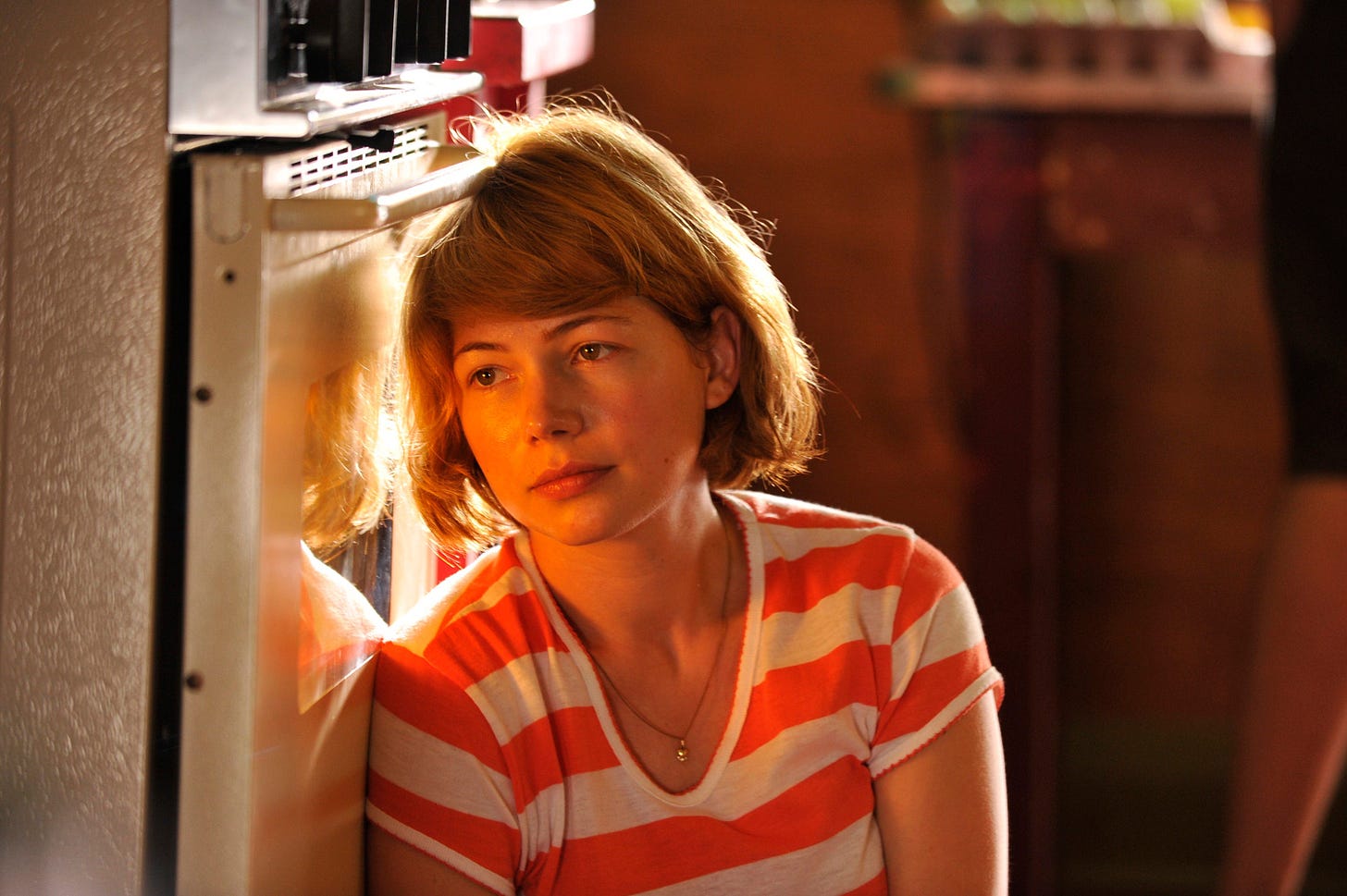Take This Waltz...please!
The ten year old Sarah Polley romantic drama left me feeling as mixed up as Michelle Williams on the Scrambler.
Please note that this week’s newsletter contains heavy spoilers for the movie Take This Waltz, but it came out in 2011, so you’ve had time.
I didn’t intend to write about Take This Waltz this week. In fact, I had a whole other post idea (my pre-teen Leonardo DiCaprio obsession), and I planned to include Take This Waltz in a roundup post later on. I wasn’t even sure I liked Take This Waltz. I was mad after I watched it, mad at certain storylines and the last fifteen minutes and the fact that I wasn’t certain what this movie was trying to say.
But as the days went on, I couldn’t stop thinking about it. I talked about it with the only two people I know who’ve seen it (my brother Alex and my friend Emily, who lived in the Toronto neighborhood where it was shot and who gave me some delightful behind-the-scenes details, some of which even involved Barenaked Ladies, as all Canadian anecdotes must). I read many, many reviews. I had so many questions. Do I like this movie? Do I hate this movie? Does it matter? One of the best things about watching a movie, I think, is the feeling of living in it for a few days afterwards. Art and entertainment should make you feel something, right? Even if that something is kind of confusing. And this film definitely made me feel the full range of human emotion: confusion about Luke Kirby. Attraction to Luke Kirby. Disgust at Luke Kirby. And finally, acceptance of my complicated feelings about Luke Kirby, who I keep calling Bruno Kirby.1
But I’m getting ahead of myself. This week, we’re talking about Take This Waltz, a movie that is certainly not a rom-com, despite the fact that I read several articles that referred to it as one (please, don’t trust any person or publication that thinks this is a rom-com). It is a romance, kind of, sort of, in that it deals with the subject of love. But it isn’t particularly hopeful or romantic. In fact, it might be pretty bleak, depending on how you view the ending.
It stars Michelle Williams, who I have fond feelings for because I’ve heard multiple second and thirdhand stories about her being a lovely person. Also, she’s very pretty. She lives in a perfect-looking neighborhood in Toronto in an artsy-shabbily decorated townhouse with her husband of five years, Seth Rogen. He’s writing a cookbook about chicken, so he’s always making chicken and inviting people over to eat the chicken and standing over a stove frowning at chicken. I knew this movie was about her falling in love with someone who wasn’t Seth Rogen, and at first I was like…hard no. Cheating on Seth Rogen? I can’t relate, because I would never be so foolish.
But then Luke Kirby hit the scene. He has very gelled hair and very strange pants and still I couldn’t look away. He has two jobs, being an artist and driving a rickshaw, and even though Emily told me that Toronto didn’t have a booming rickshaw economy in 2011 (I’m sure that’s still true today, but I don’t want to assume too much until I can go on a Take This Waltz walking tour and investigate for myself), I discarded that information and chose to believe that Luke Kirby was supporting himself with the rickshaw. This is a film that lulls you into a state of acceptance re: people affording their lifestyles in a very expensive city even though they’re occasional freelance writers or the author of one (1) forthcoming poultry-based cookbook.
But I’ve veered off track (something Luke Kirby would never do in his rickshaw). Luke Kirby and Michelle Williams meet on a plane, and it turns out he lives across the street from Michelle and Seth. Luke Kirby makes no bones about the fact that he’s into her. He’s always just…there. Standing around in his awkward pants, showing up at the pool when Michelle Williams is simply trying to do some water aerobics, biding his time until Michelle Williams realizes that he’s the man for her.
Which might not be such a big deal if Seth Rogen wasn’t so dismissive of Michelle Williams. I read a review that described them as “long married,” and maybe it’s just because I’ve been married almost twice that long and don’t think of myself as long married, but…they’re in the single digits. They haven’t been married that long, but he’s either so comfortable or bored or both that he’s not really focused on her. And while Luke Kirby is out there running that rickshaw all about town, toning his calves and working on his stamina, Seth Rogen is telling Michelle Williams that he’s just going out to dinner with her to eat food, not to catch up. I kept thinking of Ghost, when Whoopi Goldberg says, “Molly…you in danger, girl,” except this time it was, “Seth Rogen…you need to pay more attention to your wife, girl.”
Michelle Williams and Luke Kirby keep having these clandestine almost-dates where they just “happen” to run into each other, and it’s all very exciting and dangerous. But the best scene occurs on the Scrambler, a ride that I know from my hometown’s street fair. To the best of my knowledge, no one in my hometown ever had a Scrambler ride full of meaningful glances because they’re secretly having an emotional affair, but maybe that’s because no one in my hometown has Luke Kirby’s je ne sais quoi.
A while back I wrote about my favorite musical scenes in movies, and I’m thrilled to announce that I have a new one. It’s Michelle Williams and Luke Kirby on the Scrambler, set to “Video Killed the Radio Star” by the Buggles, a song I never paid that much attention to. That seems unbelievable to me now, because this scene makes it feel buoyant, romantic, mysterious, vital.
It’s perfect: exciting, silly, depressing. All at once! I’ve already watched this scene approximately 100 times and I show no signs of stopping.
As it turns out, that scene is like a microcosm of the movie as a whole. Michelle Williams does eventually leave Seth Rogen and end up with Luke Kirby, and there’s a moment where the movie feels very over. They’re together. It’s done, right? If this was a romance, then maybe.
But it’s not over. It immediately goes into a very long, very weird sex scene that was so surprising and so out of place that I laughed out loud. I’d forgotten that when I started the movie, Kanopy gave me a warning that was like, “Um, a little heads up, this movie has some graphic content that some people might find offensive or upsetting. Not you, I’m sure. Just, you know, some viewers.”2 There was a scene earlier in the movie where many women are completely naked in a pool shower, and I thought, “Damn, the female form is offensive enough that Kanopy has to warn us? What has this world come to?” But, no. The graphic sex scene that involved two separate threesomes was probably the issue.
And then there’s a whole thing where Sarah Silverman’s character, who earlier in the film celebrated one year of sobriety, relapses very dramatically. And Michelle Williams ends up, once again, in a kitchen attempting to connect with a man who isn’t paying attention to her. But this time he’s a different man, one with weirder pants and a body toned by constantly running the streets of Toronto. The movie seems to be saying…no one ever really changes. You think Sarah Silverman can stay sober? She can’t! You think Michelle Williams can find happiness with a man? Think again! It reminded me of something I heard once that may or may not be true: we all have a baseline level of happiness, and although we might temporarily be happier, we always return to that baseline level, no matter how good things get.
It was, admittedly, a pretty bleak reading of a movie. In college, one of my instructors told us not to write stories where everything was hopeless unless that was what we truly believed. He said this, I’m sure, because he was dealing with a bunch of 21 year olds who thought that that quickest way to write something worthwhile was by making it very sad. But I agree with that advice; it’s hard to watch or read something when the message is the same one that was scrawled on the wall of the girl’s bathroom at my junior high: Life’s a bitch and then you die.3
But. The movie’s final scene circles back to that jubilant, confused scene with the Buggles. This time, however, Michelle Williams is alone, sliding around on the Scrambler by herself. She starts out looking unsure, maybe a little sad. She sighs. The music is echoey, discordant, the screams of other riders vaguely menacing. It’s all hopeless, isn’t it?
But then she smiles. She’s there by herself in the glittering, neon, artificial darkness, and she’s smiling. Her hair lifts in the breeze. It’s not much, but it feels like a little glimmer of hope, some proof that maybe she’s found something inside of herself that no one else can give her.
I am, as is almost certainly very clear, not someone who thinks an unhappy or unclear ending is “subversive” or better than a happy ending. I think happily ever afters can be just as meaningful and important as bleak endings. But I also, despite what I write (all HEAs, all the time), do not think that an unhappy or vague ending is inferior to a happy one. Sometimes I want a rom-com, and sometimes I really don’t. And as angry as I got at this movie, I also really enjoyed mulling it over for the next week. It gave me a lot to consider and a lot of questions to ask myself. Namely, why am I attracted to Luke Kirby, even in those pants?
I’m attempting to work on a lot of things right now, so I’m not sure when the next newsletter will come out, but I have so much to talk to you about. The aforementioned Leo post! A quarterly update on my 2022 goals! Another rom-com post about Juliet, Naked, which I just watched! An update on everything else I’ve been watching! Whether it’s next week or sometime in the near future, I’ll see you soon.
I would also be attracted to Bruno Kirby in this role, just to clarify.
Not the exact wording, but that was the vibe I got…that Kanopy understood that I personally wasn’t a prude but wanted me to know that some people couldn’t handle it.
I hope the seventh grader who wrote that got some help.










I am STILL mad at this movie and I saw it in the theater when it was released.